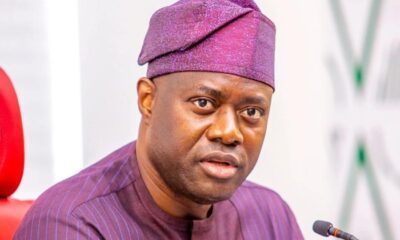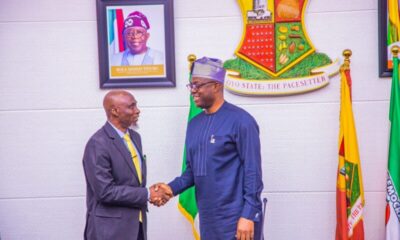News
Bodija explosion: Makinde suspends Ido traditional ruler over links with illegal miners
Oyo State Governor, Engr.Seyi Makinde has suspended the traditional ruler of Ido over his alleged connection with the illegal miners responsible for the explosion that rocked Bodija some weeks ago.
The explosion had displaced many individuals leaving five people dead and 77 sustaining varying degrees of injuries.
In a statement on Friday, the Oyo State Commissioner for Information and Orientation, Dotun Oyelade, said the traditional ruler of Ido town in Ido Local Government Area of the state, Oba Gbolagade Babalola (Gbadewolu I), was suspended by Governor Seyi Makinde.
He also said the state government took the tough measure of suspending the monarch to send signals to those aiding and abetting criminals within their territory that they were in the wrong place at the wrong time.
According to the commissioner, the Onido of Ido was suspended because of an intelligence report linking him to illegal miners in the local government area.
“In the light of our recent experience and the government’s daily efforts to rid our land of criminals, we are sending the signal to all like-minded elements to vacate our zone or be caught and brought to justice,” he stated.
On the issue of the possibility of Onido being dethroned when an investigation is concluded, the Commissioner said, “All options are on the table.”
Similarly, the Special Adviser (Media) to Oyo State Governor, Sulaimon Olanrewaju, said the suspension was approved on Thursday, February 1.
He said the suspension followed a letter dated 2nd of February, 2024 and signed by the Commissioner for Local Government and Chieftaincy Matters, Hon. Olusegun Olayiwola.
“I wish to inform you that His Excellency, the Executive Governor of Oyo State of Nigeria, in the exercise of the powers conferred on him by Sub-section 1&2 of Section 26 of the Chiefs Law, Cap. 28 Vol I, Laws of Oyo State of Nigeria 2000 and by all other enabling powers in that regard, has approved your suspension as the Onido of Ido in the area of authority of Ido Local Government Area of Oyo State,” the letter read in part.
It directed Oba Babalola to hand over all government properties in his possession to the chairman of Ido Local Government
News
Tinubu to return Wednesday – presidency
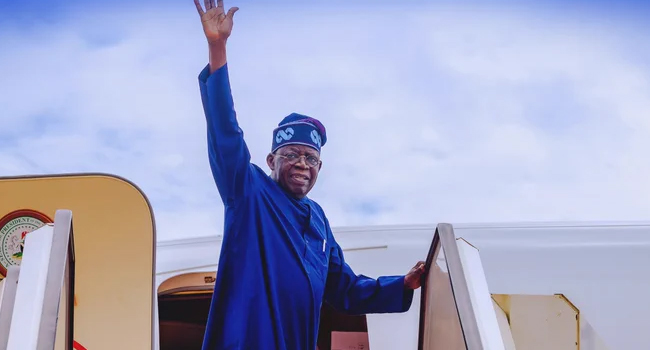

The presidency has announced that President Bola Tinubu and his aides will return to Nigeria from Europe on Wednesday.
The special adviser on information and strategy to the president, Bayo Onanuga, announced in a post on his X handle on Tuesday.
“President Bola Ahmed Tinubu, along with his aides, will return to Nigeria tomorrow from Europe,” Onanuga wrote.
On April 22, Tinubu left Abuja, the country’s capital, for the Netherlands on an official visit.
The presidential spokesperson, Ajuri Ngelale, stated that the president was visiting The Netherlands at the invitation of Prime Minister Mark Rutte.
After the engagements in the country, Tinubu travelled to Riyadh, Saudi Arabia, between April 28 and 29 to attend a special World Economic Forum meeting.
Details later…
Crime
Engineering education springboard to Nigeria’s economic growth – VP Shettima
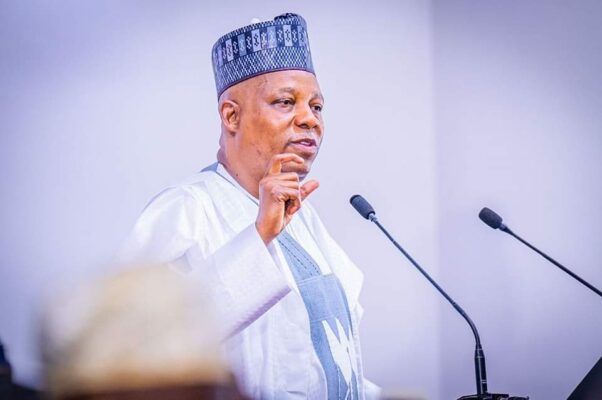

The Vice President, Kasim Shettima, says the quality of engineering education would help promote indigenous technology.
He spoke on Tuesday at a forum organised by the Nigerian Academy of Engineering in Abuja.
According to him, with the increasing urbanisation in Nigeria, 70 per cent of the Nigerian population will be in cities by 2050.
The VP, represented by his adviser on power infrastructure, Dr Sadiq Wanka, stressed that Nigeria could use its growing population to tap into the opportunities in the $360 million global outsourcing market.
“We also find ourselves facing rapid urbanization in the country, as estimates suggest that by 2050, 70 per cent of the Nigerian population will be living in cities. Given the nature and scale of the challenges ahead, the strength of our engineering capacity is inextricably linked to our economic and social progress.
“Nigeria is blessed with a young population. Our population is growing at over 3% per annum at a time when, in many developed nations, populations and workforces are ageing. Therefore, we can train our young citizens and position them to take up jobs in Nigeria and globally. And we are.
“Earlier this year, in line with Mr. President’s commitment to job creation, I launched the Outsource to Nigeria Initiative, which seeks to position Nigeria as a global outsourcing hub and tap into a $360 billion global outsourcing market,” he said.
In his speech, the President of the Nigerian Academy of Engineering, Prof Peter Onwualu, noted that if Nigeria prioritizes and uses Engineering and Technology to drive development in all sectors, the country will, in short, join the League of Developed Nations.
“With Engineering and Technology, we would our problems in food and agriculture, health care, communications, transportation, energy, power, commence, industry and indeed all sectors.
“If Nigeria can harness its technology efficiently, this will lead to a drastic drop in importation and promotion of made-in-Nigeria goods”, he told newsmen.
News
Cement price: Reps issue Dangote, BUA, others 14 days ultimatum to appear
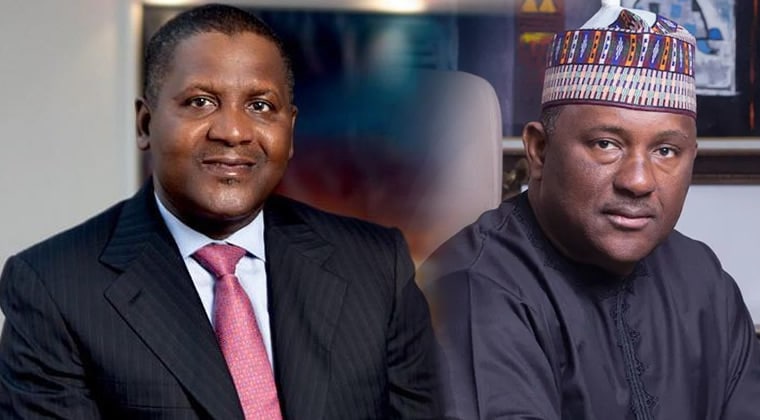

The House of Representatives has issued a 14-day ultimatum to Dangote Cement, BUA, Lafarge Ashaka and other cement manufacturing companies in Nigeria to appear before it to make their submissions over the arbitrary increases in the price of the commodity nationwide.
The Chairman, House Committee on Solid Minerals, Mr Gaza Gbefwi, gave the directive at a public hearing to investigate the arbitrary increase in the price of cement in Nigeria by cement manufacturers, organised by House Joint Committees on Commerce, Industry, Special Duties and Solid Minerals on Tuesday in Abuja.
The PUNCH reported on March 13, 2024, that the House adopted a motion on the “Arbitrary increase in the price of cement by the cement manufacturers in Nigeria”, and constituted a joint committee to investigate and report back to it for further legislative action.
At the public hearing on Tuesday, none of the cement companies appeared or sent representatives to make submissions on their behalf.
Angered by the development, Gbefwi who represents Karu/Keffi/Kokona Federal Constituency, Nasarawa State, said the parliament was not in receipt of a court order restraining it from inviting anybody or companies for investigative purposes.
He said: “We are trying to see to the development of our country. Just as it was emphasized in the opening remarks, cement is to building what air is to every human being. In the human nature of the House, because we owe them a duty of care because they are equally Nigerians, we are giving them 14 days to make their submissions.
If not, as we have sworn to uphold the constitution, we will use everything within our powers to make sure that Nigerians are not taken for granted and are not exploited. We will not sit back while some companies declare billions in naira and dollars every day while our people can barely afford to get a decent roof over their heads.”
“We have seen in Lagos where you have Nigerians under the bridge and paying rent. Why? If this product was available, I do not believe we would go to that length. Moreover, God has given to this nation, resources in abundance. So, this joint committee resolves to give them 14 days from now, and not 14 working days but 14 days to make sure that they make their submissions and appear before this House,” he said.
Earlier in his remarks, the Speaker, Abbas Tajudeen, represented by the Deputy Speaker, Benjamin Kalu, pledged the readiness of the House to come up with appropriate legislation to encourage the industrialisation of the country.
He also assured the companies invited for deliberations not to see their invitation as a witch-hunting mission, adding that the parliament was only interested in assisting in resolving the challenges in the building sector occasioned by frequent hikes in the price of cement.
He said: “We are committed to collaborating with both cement manufacturers and end-users, believing this is the most effective way to improve the quality of life and standard of living for our citizens. We are also dedicated to enacting laws that prevent a recurrence of the factors that led to the current situation.
“Our goal is to inform Nigerians about the industry’s current state and collaboratively find solutions to navigate the challenges. The persistent rise in cement prices has had a detrimental impact not only on the building environment but also on the entire economy. Cement is a fundamental component used in construction projects like bridges, dams, houses, waterworks, and road infrastructure. This makes addressing this issue paramount.”
Quoting research by the African Development Bank, Kalu said there is a housing deficit of up to 16.9 million units, adding that Lagos, Ibadan, Kano, and Abuja, have a 20 per cent rise in housing needs yearly. The current total output in the formal housing sector is estimated at not more than 100,000 units”.
The Deputy Speaker asserted that bridging this gap requires affordable and accessible cement prices for both the government and the private sector.
“While factors like exchange rates have contributed to the price increases across various commodities, it is encouraging to see the positive results of the “Renewed Hope” administration’s policies under the leadership of Bola Tinubu. Notably, the naira has shown remarkable strength against the dollar in recent weeks, and Fitch Ratings, a global credit rating agency, recently revised Nigeria’s credit outlook to positive from stable”, he added.
Earlier in his welcome address, Gbefwi said that Nigeria has a high housing deficit of about 3 million units and a huge infrastructural deficit.
He stated: “Indeed the recent events that led to the skyrocketing of the price of cement in Nigeria has been worrisome and of great concern as it is inflicting untold hardship on Nigerians.
“To close this gap, both government and the private sector must be articulate and deliberate in putting the right policies and parameters in place that can promote, induce and or encourage development.
He added that the cost of cement is higher in Nigeria compared to other countries in Africa using the current exchange rate of the dollar to local currencies.
“Our review of cement prices in other countries like Kenya, India and Zambia for 2021 alone shows that Nigeria has the highest price of cement using the official exchange rates for each country. Nigeria’s price of cement doubles that of India at a difference of 69 per cent. Similarly, the price is 29 per cent higher than that in Kenya and 39 per cent higher in Zambia; hence the need for us to come together and find out why,” he added.
-
capital market2 years ago
Rt.briscoe, FBNH, Others halts negative performance of stock market
-
Finance3 months ago
Court orders Sen. Victor Umeh to repay N136m bank debt to AMCON
-



 Abuja Update2 months ago
Abuja Update2 months agoUNDP, FG partnership needed to achieve inclusion, equity- Minister
-
Abuja Update1 month ago
Banks drive stock market performance with N147bn gain
-



 Business2 weeks ago
Business2 weeks agoTingo Group unveils Tingo Electric, Tingo Cola drink at Lagos launch
-



 Health3 weeks ago
Health3 weeks agoCapacity training will reduce migration of health workers- NPHCDA
-
News4 months ago
Oil thieves sponsoring malicious media campaign against Navy – Spokesman
-



 Infotech1 month ago
Infotech1 month agoWorld Backup Day: NITDA urges Nigerians to ensure backup of data

